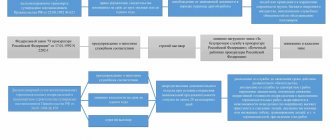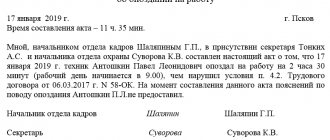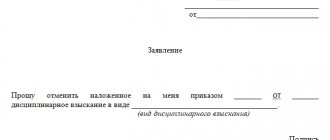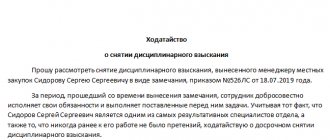What is the difference - differences
There is no fundamental difference between disciplinary sanctions such as a reprimand and a reprimand.
If you read Article 192 of the Labor Code of the Russian Federation, you will find that penalties for the guilty employee are carried out in the following order:
- comment;
- rebuke;
- dismissal.
Both penalties have the same validity period and are applied in the same cases.
The imposition of several reprimands or reprimands gives the right to dismiss an employee under clause 5 of Article 81 of the Labor Code of the Russian Federation.
The difference between a reprimand and a reprimand is the fact that the first type of penalty is used as a primary warning and is a signal to the employee that they need to take a closer look at their behavior and try to maintain discipline and work duties at the proper level.
A reprimand differs from a reprimand in that it is a more severe form of discipline, is expressed in writing and is reflected in the employee’s personal file. Usually, an entry about these types of penalties is not made in the labor record.
If you carefully read the labor legislation, namely the Labor Code, Article 192 of this document puts the remark one line above the reprimand. Based on this, it can be considered that it is a lighter punishment than a reprimand.
But in fact, labor legislation does not set restrictions on the choice of penalties and does not rank what to accept or not to accept. Everything happens at the discretion of the employer. Therefore, it does not matter whether the reprimand or reprimand was issued. Both will comply with the letter of the law.
More often, a remark or reprimand is used as a warning, which should not go unnoticed by the employee.
The difference between a remark and a reprimand under the Labor Code
Disciplinary action is a legally established method for optimizing employee performance. It can be used in all areas where there are hired workers: enterprises of all forms of ownership, public service, military service.
ON THE. Badrak
“Labor Code of the Russian Federation” dated December 30, 2001 N 197-FZ (as amended on July 3, 2016) (as amended and supplemented, entered into force on October 3, 2016). Article of the Labor Code of the Russian Federation 192 “Disciplinary sanctions”.
Any penalty is imposed on an employee only in case of improper performance or neglect of his official duties.
The responsibilities of each employee must be documented in the job description. The employee must familiarize himself with the document with his signature. Otherwise, the employer will not be able to issue a reprimand or reprimand, since the employee performs a vaguely defined range of duties.
The legislation of the Russian Federation does not provide for a clear sequence of application of penalties. It is not necessary that a reprimand comes first and then a reprimand. If the manager considers the employee’s misconduct to be particularly serious, then a reprimand may immediately follow and be entered into his personal file.
Neither a reprimand nor a reprimand can be entered into the employee’s work book. The HR specialist makes records of disciplinary offenses in personal cards in order to control their number for the same employee.
A reprimand is issued by the manager, most often orally, for offenses that do not cause serious harm to the work of the organization. The purpose of the comment is to direct the employee’s activities in a more productive and safer direction. Local regulations may stipulate the permissible number of comments for one employee. To keep an official record of comments, they are documented in the form of an order from the manager.
Announcement of remarks orally
The reprimand period does not apply, unlike a reprimand (1 year).
An employee is reprimanded if serious violations, in the opinion of the manager, are committed. Such violations include:
- actions or failure to take necessary actions, resulting in material damage to the organization;
- damaging the organization's reputation.
Definition and applications
The concept of “reprimand” is the imposition of a penalty for improper performance of functions provided for by the Labor Code of the Russian Federation, the Labor Agreement, Internal Regulations (if a link to it is indicated in the Labor Code and the employee is familiar with it against signature) and other regulatory documents of the enterprise.
The Labor Code of the Russian Federation does not contain a clear list of violations for which a reprimand can be issued. Article 192 simply states the employer's right to impose these penalties. However, over the entire period of operation of the Labor Code of the Russian Federation in its current edition, certain unspoken rules for manipulating this article of the code have developed. Thus, a reprimand is applied in cases of serious, repeated or systematic violations, such as:
- direct violation of articles of the Labor Code of the Russian Federation (for example, this may be a violation of safety regulations, non-compliance with work schedules, absence from work, failure to fulfill direct duties, etc.);
- actions that are not prohibited by the Labor Code of the Russian Federation, but are an integral part of compliance with labor discipline (refusal to undergo a medical examination, refusal to undergo TB training, etc.);
- creation of a situation that entailed damage to the property of the enterprise (shortage, damage to inventory, etc.).
Consequences of a reprimand and reprimand for an employee
If the manager considers that the number of comments made to the employee exceeds the permissible norms, then a reprimand may follow. Dividing a reprimand according to severity (for example, a severe reprimand) is unacceptable under the Labor Code of the Russian Federation.
Consequences of a reprimand for an employee:
- entry into the employee’s personal file, but not into the work book;
- the employee is under special control for one year. For repeated actions that resulted in a reprimand, or actions of a similar nature, the employee may be fired;
- if the organization pays additional incentive payments (bonuses, bonuses), then the manager has the right to deprive the guilty person of these payments;
- the guilty person may have his vacation dates rescheduled (this option must be specified in the collective agreement, additional agreements, and other local documents of the organization).
Let us repeat that measures to deprive of material payments must be documented. Each employee must sign that he is familiar with the incentive measures and deprivation of additional payments to personnel in this organization. Otherwise, the employee will be able to prove the illegality of management’s actions, and all due payments will have to be returned to him.
What is the difference between a penalty and a reprimand in Appmia?
This is stated in Art. 192 Labor Code of the Russian Federation. A disciplinary offense is a violation by an employee of the provisions of his job description, as well as internal regulations or labor discipline. For such violations, the employer has the right to impose disciplinary sanctions, one of which is a reprimand.
Although, according to Art. 149 of the Labor Code (Labor Code), he must take into account the following factors: The reprimand must motivate the employee to properly perform his work duties, and, remembering the threat of dismissal, he must not commit further offenses in the future. A reprimand is a type of disciplinary sanction.
This is interesting: How much money was allocated in Saransk for a young family in 2021
The procedure for announcing reprimands and reprimands. Sample
Based on the requirements of Article 193 of the Labor Code of the Russian Federation and local regulatory documents of the organization, the algorithm for announcing a reprimand or reprimand is drawn up in the following sequence:
- Before drawing up a report identifying a violation for which an employee receives a reprimand or reprimand, the law requires that the employee be given an explanation. That is, set out in writing a version of the development of events that led to a specific negative result. 2 days are allocated for writing an explanatory note. Previously, the manager draws up a notification-request addressed to the employee to write an explanation.
Sample format for notification of the submission of an explanatory noteThe employee writes an explanatory note addressed to the manager and is drawn up in free form. The date and signature must be indicated.
- If a note is provided explaining the cause of the incident, the manager analyzes the situation and determines the measure of punishment from the perpetrator.
- If the employee cannot or does not want to provide an explanatory note, then the employer draws up a report identifying violations in the employee’s work.
Sample of writing a report on identified violation - If the manager comes to the conclusion that the misconduct of the guilty employee deserves a reprimand or reprimand, then an appropriate order is issued. The order must be accompanied by an explanatory note from the guilty employee and an act on the identification of the violation. The employee must be familiarized with the order within five days.
Sample order to issue a reprimandIt is not always possible to detect a violation on the day it occurs. The manager has the right to announce a penalty within one month from the moment the employee’s misconduct is discovered. The statute of limitations for collection is also determined by law - 6 months. After this period, if the fact of violation has not been discovered, it will not be possible to impose a penalty on the employee.
If an employee’s misconduct results in material damage to the organization (for example, when a violation of tax laws is revealed), then the statute of limitations for imposing a penalty increases to two years from the date of the offense.
Instructions: how to give a stern warning to an employee
The list and procedure for applying disciplinary sanctions is determined by Article 192-193 of the Labor Code of the Russian Federation. The following measures are provided:
- comment;
- rebuke;
- dismissal for appropriate reasons.
This list is closed and the organization does not have the right to apply other measures of influence, such as a warning, compensation for losses, disqualification, a reprimand entered into a personal file, a strict warning or punishment in the form of deprivation of part of bonus payments and others.
There is an exception to this rule - para. 3 tbsp. 192 of the Labor Code of the Russian Federation provides that for some categories of citizens other regulatory legal acts may introduce other measures of influence.
Features and types
To figure out whether a warning is a disciplinary sanction or not, let’s look at the law. A warning is a concept from administrative legislation; this type of censure is provided for in Art. 3.
4 of the Code of Administrative Offenses of the Russian Federation for legal entities and individuals who have committed minor offenses without negative consequences. Employees of internal affairs bodies and other authorized persons can impose such punishment.
A strict warning is a concept in everyday life, not legal practice. No legal act has recorded such an impact. But it is often used by managers as a way to scold an offending employee.
There is no warning under the Labor Code of the Russian Federation. There is an analogue to it in the code - a remark. It can be done according to Art. 193 Labor Code of the Russian Federation.
Features for the budget and civil service
Law enforcement officers are warned about incomplete official compliance.
Regulatory documents (military regulations, regulations on discipline) do not contain a specific definition of this concept, but directly indicate the possibility of its application to employees.
In practice, incomplete professional compliance is usually understood as an employee’s low discipline and failure to comply with legal requirements.
For the military, employees of internal affairs bodies, civil servants and some other categories of workers, the relevant legal acts provide for the following punishments: reprimand, warning, dismissal on appropriate grounds and some others.
How does a warning differ from other penalties?
A common remark is the mildest form of reprimand. It is rather an educational measure rather than a real punishment. It is used for minor violations on the part of the employee and rarely entails significant legal consequences.
It is possible to deprive an employee who has such a punishment of incentive payments or bonuses if this is provided for in the internal documents of the organization regulating the procedure for rewarding employees.
Warning and reprimand - the same thing or not
It's not the same thing.
In contrast to a reprimand, a reprimand is a rather serious measure of influence on negligent employees, used in case of serious violations such as absenteeism, failure to fulfill their duties, etc.
Its legal consequences are much more serious. An employee who has two or more correctly executed unexpired reprimands for various offenses can be dismissed under clause 5 of Article 81 of the Labor Code of the Russian Federation.
When to apply
The most common are reprimands and warnings (including about incomplete official compliance) among civil servants. At the same time, a warning about incomplete compliance is a more “heavy” penalty and can negatively affect the fate of the employee when making personnel decisions.
What exactly to apply to the employee - a warning, a reprimand - what sequence of penalties is determined depending on the seriousness of the offense and the degree of guilt of the employee, taking into account the requirements of the organization’s LNA and established practice.
Design rules
A warning, reprimand, or dismissal must be formalized in compliance with the procedure established by the Labor Code of the Russian Federation and other regulations governing discipline issues.
Schematically, the design procedure can be represented as follows:
- Committing an offense.
- Detection of misconduct.
- Internal inspection, request for explanations from the offender.
- Determining the degree of guilt of the employee and deciding on the need for punishment and its type.
- Application of one or another measure of influence.
For clarity, let’s look at the execution of a collection using an example. Horse riding teacher Petrov Petrovich did not show up for a scheduled show jumping lesson, which put the young students who came to the training and were left unattended in danger.
The procedure for investigating and punishing an employee in this case will be as follows.
Step 1. First, you need to record the fact that the employee is absent from the workplace. For this purpose, an absence from work report or other similar document is drawn up. The basis for it may be an internal memo from colleagues or information received from other persons.
Download
The act might look like this:
Download
Step 2. Then a thorough internal audit is carried out, the purpose of which is to find out all the circumstances of the case and the reasons for what happened. You can interview witnesses and request documents from them and employees that may shed light on the situation.
During the inspection, it is necessary to ask for an explanation from the offending employee (in writing). For this purpose, he is given a special notice.
Download
The employee is given 2 days to provide explanations.
Step 3. The employee must state his vision of the situation, explain the reasons for his action, and also attach supporting documents if necessary.
Download
If he refuses to explain, this is recorded by an act of any form, for example this one.
Download
Step 4. Based on the results of the inspection, a written conclusion can be drawn up (for civil servants it is mandatory), which must be brought to the attention of the employee.
Analyzing the circumstances of the case, management decides on the need to impose a penalty.
In our example, no one was hurt, so we can limit ourselves to making a comment.
Step 5. Since an oral warning cannot be considered a disciplinary sanction, it is necessary to confirm the fact of the penalty with a written order of management in a free form.
Download
The employee is familiarized with the order within 3 days after signing.
An employee can be punished within a month from the moment the offense was committed! You can't do it later.
Can I cancel or replace?
The penalty can be lifted at the initiative of the manager or at the request of the employee himself, if the management considers it possible to satisfy it.
After a year has passed from the date of punishment, an employee who has not violated discipline during this period is considered to have no penalties.
If an employee considers himself to be wrongfully punished, he can seek protection of his rights from a trade union, the State Labor Inspectorate, the prosecutor's office or the court.
What consequences await the offender?
The consequences of a warning at work are different and depend on what is provided for by the local regulations of the enterprise. In organizations where it is customary to award bonuses to employees, a necessary condition for receiving funds is that the employee has no outstanding comments or reprimands.
In the public sector, punishments will prevent you from participating in competitions to fill vacant positions, receiving another class rank, etc. If an employee has been repeatedly given a warning before being reprimanded, the next step of management may well be dismissal.
Source: https://gosuchetnik.ru/kadry/instruktsiya-kak-vynesti-rabotniku-strogoe-preduprezhdenie
An employee’s rights to appeal a collection order
Despite the fact that the employer brought the guilty employee to disciplinary action without violating the law, the employee has the legal right to disagree with the order. The guilty employee has the right to state his version of the event, which is recorded in the explanatory note. The employee may have valid reasons for what happened or evidence that the disciplinary sanction was imposed unfairly. An employee who stands up for the truth can appeal to higher authorities to prove his innocence (labor inspectorate, courts, trade union or special commission for resolving labor disputes).
The Labor Inspectorate is obliged to consider the application and begin an investigation within 30 days.
The trial requires the plaintiff to pay a state fee, collect and provide all documents proving innocence. The court is guided by the provisions of the civil law code, taking into account the interests of both the employee and the employer. If the legal dispute is resolved in favor of the plaintiff, the court will oblige the employer to pay all expenses incurred by the plaintiff (including payment for the services of a legal representative) and remove the disciplinary sanction from the employee.
The commission for the resolution of labor disputes is created from among the employees of the enterprise, necessarily including a representative of the trade union (if there is one). The commission must begin to resolve the dispute within 10 calendar days from the date of receipt of the application. Article 385 of the Labor Code of the Russian Federation determines the procedure for considering labor disputes without involving a third party (labor inspectorate, court).
The optimal measure for resolving labor disputes is the creation of a commission (CC). However, resolving not all controversial issues is within its competence. Issues resolved directly in court:
- Reinstatement of an employee in a removed position.
- Reinstatement after dismissal.
- Solving financial issues (nuances of payroll in case of demotion, payment for excused absences from work).
- Resolution of disputes regarding the organization’s guilt in causing damage to an employee.
Disagreement with reprimand
The employee is not required to agree to the reprimand. Especially in cases where his direct guilt is not observed. After all, individual employers often, for the purpose of “prevention,” try to punish the entire small team, and not just the direct culprits. In this case, the sequence of actions may be as follows:
- At the investigation stage, file a complaint with the trade union so that they do not approve the disciplinary materials submitted for approval.
- If the order is nevertheless signed, the employee can appeal to the labor inspectorate, the prosecutor's office, or directly to the court. But for this it will be necessary to prepare an evidence base in order to argue against the administration’s decision.
- It should be taken into account that complaints about the employer’s actions must be written in writing, preferably no later than a month from the date of the decision to impose a penalty. Otherwise, the authorized bodies may refuse to satisfy the request after the statute of limitations has expired.
Remember, a reprimand is given individually to an employee for specific violations. If several employees are guilty, then the guilt of each of them must be proven individually. Otherwise, such a decision should be appealed.
Removal of disciplinary action
A disciplinary sanction is lifted after one calendar year from the date of issuance (Article 194 of the Labor Code of the Russian Federation). This happens if the employee has not earned a new penalty within a year.
The manager, on his own initiative, can decide to remove the penalty ahead of schedule.
The removal of a penalty can be determined by a labor commission, a ruling of a judicial authority or a decision of the labor inspectorate.
The penalty may be lifted at the request of the employee himself.
Sample order for early removal of a disciplinary sanction
What is the impact of the comment?
Any disciplinary sanction is unpleasant for the employee both from an economic and psychological point of view. The first remark usually significantly reduces work enthusiasm and reduces production performance. But there are also advantages: subordinates who have been “at fault” show more responsibility in the production process, closely monitor the work schedule and improve their own skills.
A competent leader, before punishing a subordinate, must assess the possible consequences. If we are talking about a minor offense, then sometimes you can get by with an ordinary conversation.
Through disciplinary punishments, you can influence both an individual employee and the team as a whole.
The video contains additional information about disciplinary sanctions.









